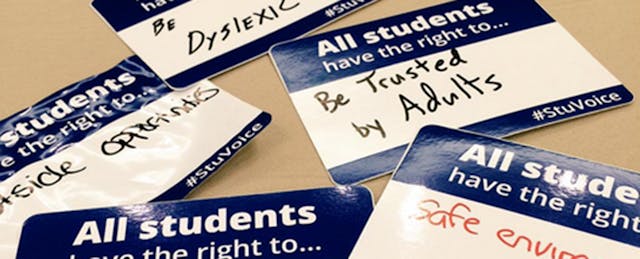When you think of SXSW, the first thing that comes to mind probably isn't the three-day education conference that precedes the interactive film and music festival that draws over 50,000 people to Austin, Texas. And even when you picture a typical education conference, most people don't normally expect there to be students in attendance.
Despite the fact that the purpose of education is theoretically for the betterment of the students, they are often absent at these conferences and other conversations about education that affect them the most. This year, the nonprofit Student Voice aimed to change that with the first ever student-led education summit at SXSWedu, called “The State and Future of Student Rights.”
Along with many notable adult speakers like Dr. Dallas Dance, superintendent for Baltimore County Public Schools, Marc Chun, Education Program Officer at the Hewlett Foundation and Harold Levy, the Executive Director of the Jack Kent Cooke Foundation and former Chancellor of New York City Public Schools, the conference featured a lineup of a few dozen elementary school to college students from a variety of socioeconomic and diversity backgrounds. The students and other education stakeholders at the summit gathered to discuss the rights they believe all students deserve and how to integrate these rights in schools across the country.
The summit kicked off with a panel on “The Right to be Heard.” Moderated by Associate Producer for NBC News Kyle Scott, this panel shed light on how we can help marginalized students whose voices are often silenced the most and how schools can better listen to their students’ needs and educational requests. Superintendent Dance spoke about how in his district, he asks the student governments how he can help them achieve the goals they set for the year, for themselves and for their schools. Giving students a voice also requires a mindset shift because, as high school senior Dawnya Johnson said, “Students are led to accept the world as it is, not fight for what it should be."
Following this session, two students from the Minerva School (Alisha Fredriksson and Or Segal) and the youth liaison to the Department of Education (Sam Ryan) each spoke about what their respective organizations are doing to include students in education decision-making and curriculum design. For example, the DOE is conducting a survey on sexual orientation harassment and bullying in schools with the intention of using the data to help shape policy that will better serve students.
All of these panels and speeches led to the unveiling of the Student Bill of Rights, a platform, set up similarly to the UN MyWorld 2015 Campaign, on which students can vote for the issues they deem to be most important in their school and community. The goal is to help uncover the underlying issues in specific school districts and empower schools to identify ways to be more student voice friendly.
Currently, the bill contains 11 rights, which span from the constitutional to the education-specific; explanations for each can be found on sturights.org:
- Free Expression
- Safety and Well-Being
- Due Process
- Personal Learning
- Institutional Agency
- Information and Privacy
- Employability
- Civic Participation
- Fair Assessment
- Technology
- Diversity and Inclusivity

As a high school senior, I think the Student Bill is important because as it stands currently, students practically have no rights. In private schools, students aren’t guaranteed many of their Constitutional rights, such as true free speech and due process, and even in public school, in terms of discipline especially, students aren't told their options nor made aware that they even have rights.
Hearing the student speakers, like 8th grader Ben Cooper, who has spoken at the capitol advocating for students with learning disabilities, share stories of how they've taken charge of their education and how they've struggled within the confines of a traditional school model, reaffirmed for me the importance of a Student Bill of Rights. It provides an infrastructure of sorts, upon which students can lean in times of conflict with the administration or frustration with the status quo of a school climate.
In addition, it serves as a way to keep the system accountable and encourage those students who wouldn't normally speak up to take a stand for what they believe in (which is especially difficult if their future holds in the balance, as it does in many cases where a teacher recommendation could determine whether you even graduate or go to college).
To me, all students deserve that opportunity. They have the right to know they have a voice and that their voice matters. The students who spoke at the Student Voice Summit at SXSWedu on the State and Future of Student Rights this week are living proof that there is a need to recognize student voices. More and more students are sharing what they have to say and the world is listening, one conference, one partnership, one youth advisory board at a time.


